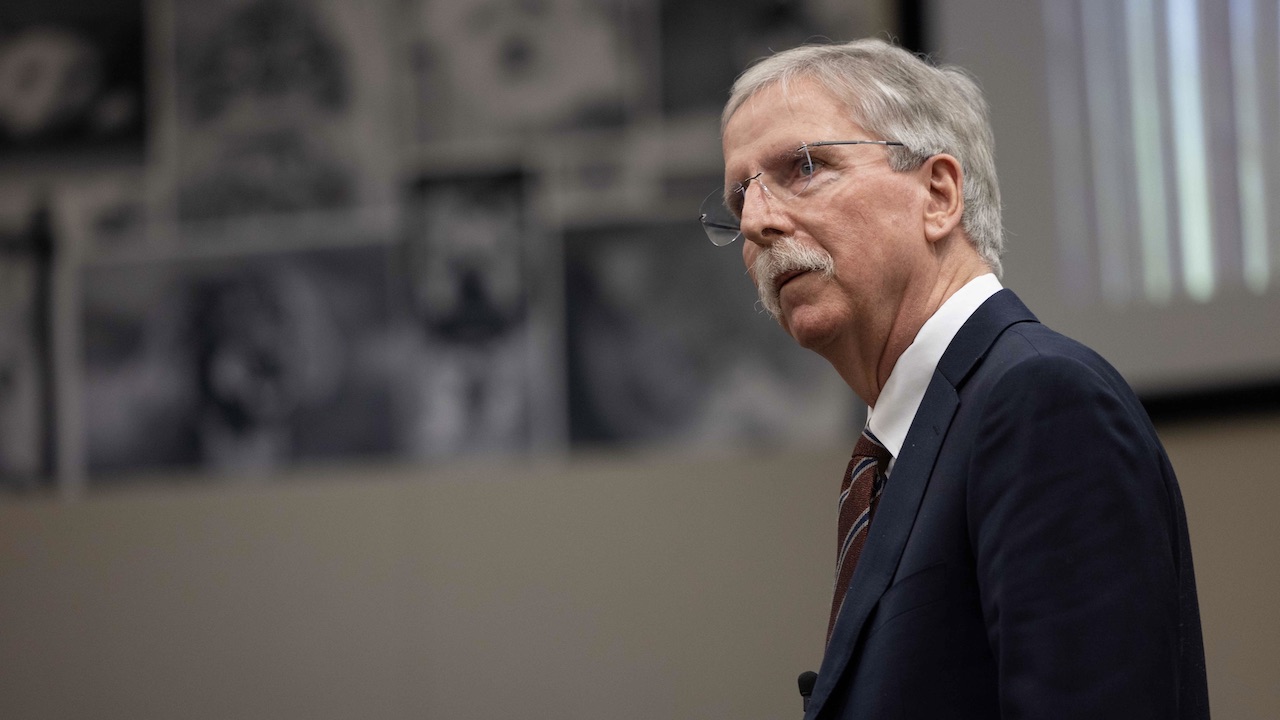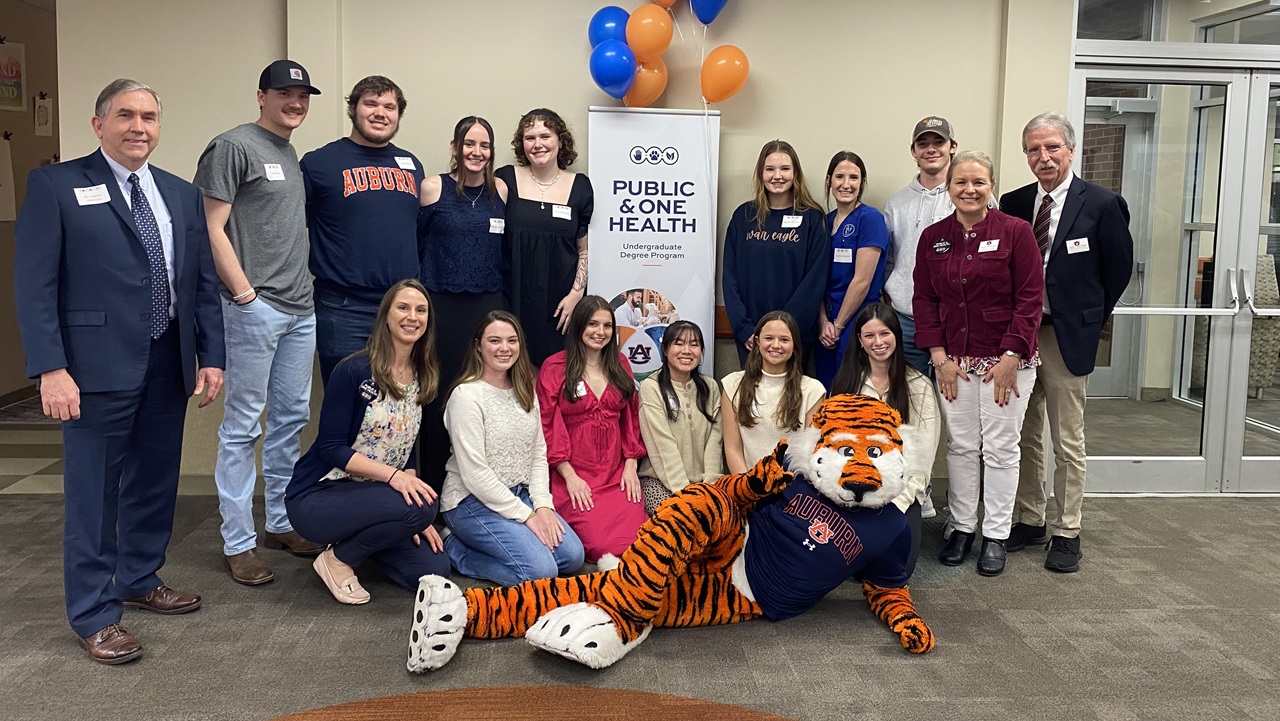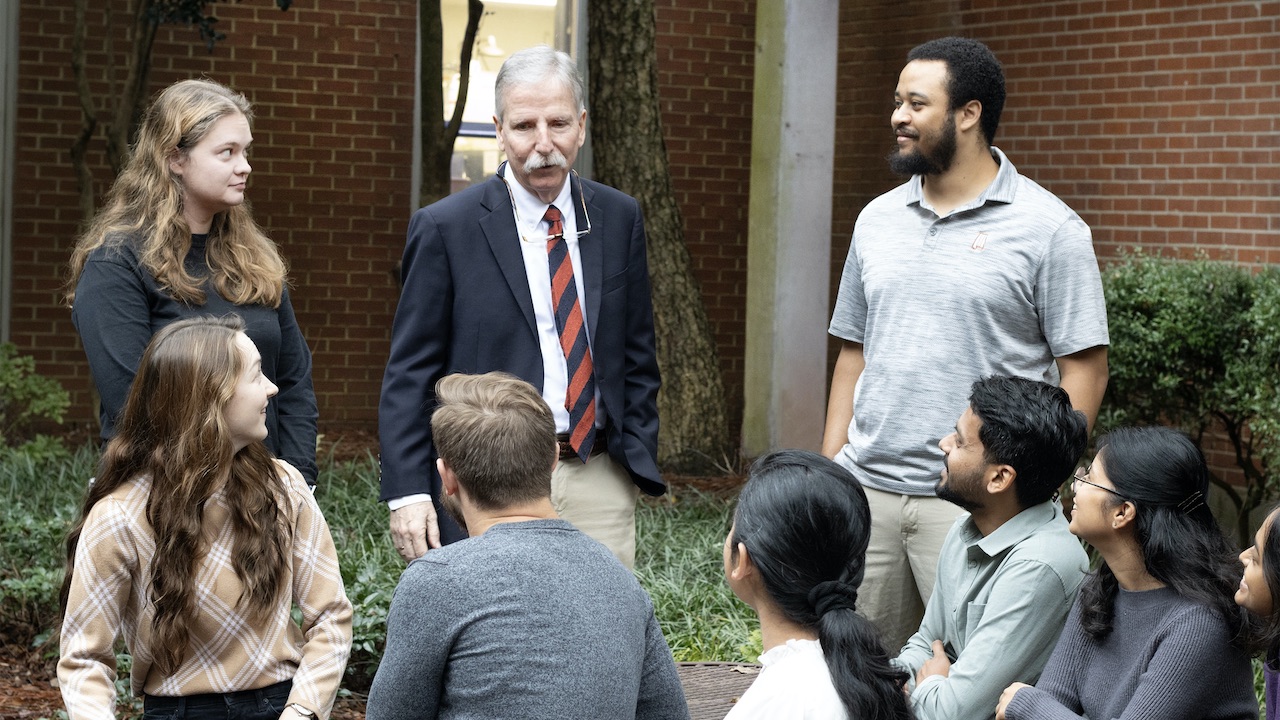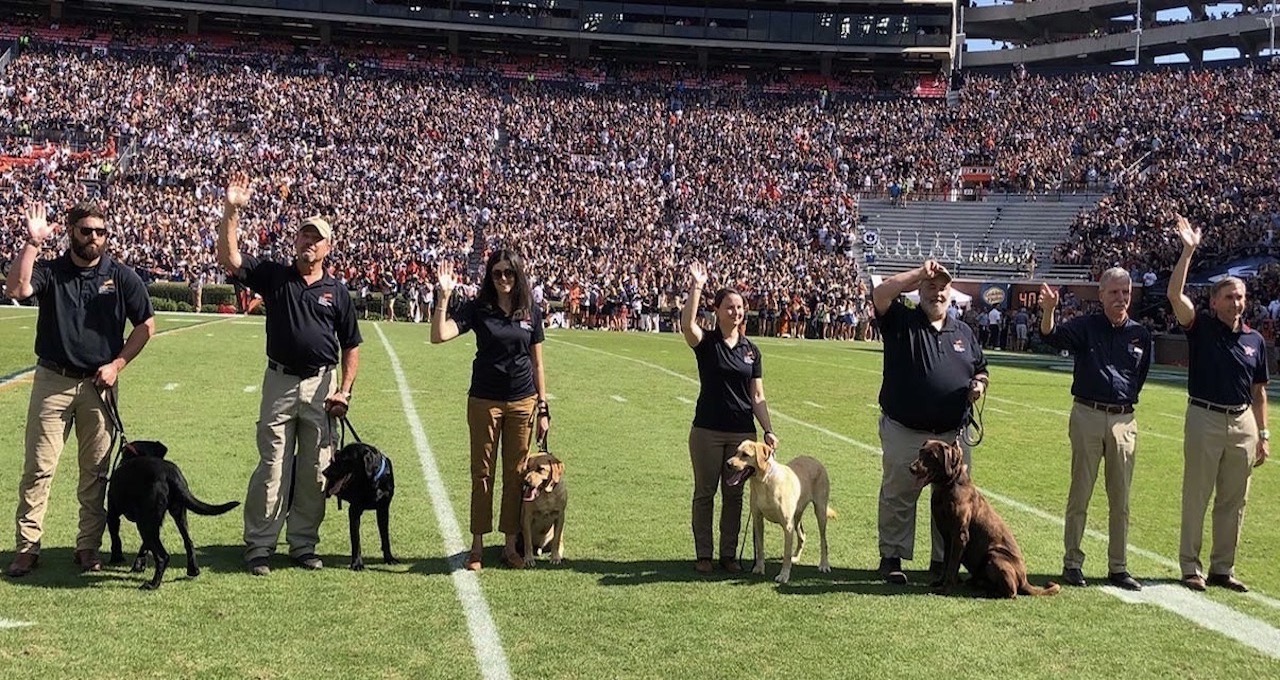content body
Every year, the Southeastern Conference (SEC) recognizes faculty members with exceptional research and scholarship records. On Wednesday, the SEC announced Professor and Associate Dean of Research and Graduate Studies Frank F. “Skip” Bartol as this year’s representative for Auburn University.
The nomination comes as no surprise as Bartol has been a leading scholar and educator at Auburn University and in the College of Veterinary Medicine for more than 40 years.
From research in reproductive and developmental biology to founding the AU Cellular and Molecular Biosciences program to advancing the Bachelor of Science program in Public and One Health (PAOH), Bartol has engaged in many intellectual pursuits and served in several leading roles on Auburn’s campus.
Bartol lands at Auburn … and stays
The path of doctoral graduates following graduation was in flux in 1982. In life sciences, one could still go straight into a tenure-track position, but the norm was shifting to doctoral graduates moving into post-doctoral training before initiating independent research careers.
Bartol had a postdoc position lined up on the west coast but was encouraged to apply for a tenure-track opening at Auburn, a position to which young scientists and academicians aspire.
“Being able to work with target species and having the opportunity to teach undergraduate and graduate courses was a good deal,” Bartol said. So, he went for it, and almost 41 years later, he’s still here.
Following his original appointment in the College of Agriculture, Bartol became an adjunct professor in the College of Veterinary Medicine. In 2009, he assumed his current position as associate dean, with this summer marking 15 years in the position.
Humbled by the honor
In talking about his research, Bartol acknowledges the colleagues with whom he’s partnered to move the work forward, indicating without words that he is not one who seeks the spotlight. But the SEC spotlight is now his.
“It means a great deal to earn this recognition,” Bartol said. “I could name a half dozen people who are deserving. It is humbling and surprising, and I appreciate it very much.”
Bartol has spent his entire professional career at Auburn.
“I have admired Dr. Bartol’s pioneering research and spirit of innovation for many years. I am thrilled that he is receiving this richly deserved recognition.”
Research + scholarly endeavors
Bartol is most proud of his extensive reproductive and developmental biology research, and rightfully so.
“I am, at my core, a reproductive and developmental biologist and physiologist,” Bartol said.
He credits research done by University of Florida (UF) Professor Donald Barron and Bartol’s wife, Anne Wiley, as the catalyst for the research driving the core of his reproductive sciences program at Auburn.
In fact, Wiley worked in Bartol’s lab as a senior research associate for almost 40 years (and they’ve been married even longer). Together, they have engaged in research involving large domestic animals that has immediate impact in production animal agriculture and can translate to the human condition.
With colleagues from UF and Texas A&M University, Bartol has contributed to the field of domestic ungulate uterine developmental biology, specifically with the development of the Uterine Gland Knock-Out Model (UGKO). This helps scientists consider how the animal’s developmental trajectory affects their reproductive efficiency or fertility and fecundity in adulthood.
Also, Bartol and his colleagues at Rutgers University coined the term lactocrine, which is the transmission of milk-borne bioactive factors from mother to offspring by consequence of nursing. They also proposed the lactocrine hypothesis and demonstrated lactocrine programming.
“This work in uterine development and maternal lactocrine programming of postnatal development has broad implications for reproductive efficiency and health,” Bartol said. “We need to understand a great deal more about how mother’s contributions to development in the early postnatal period support an optimal organizational developmental trajectory for both economically important domesticated animals and children.”
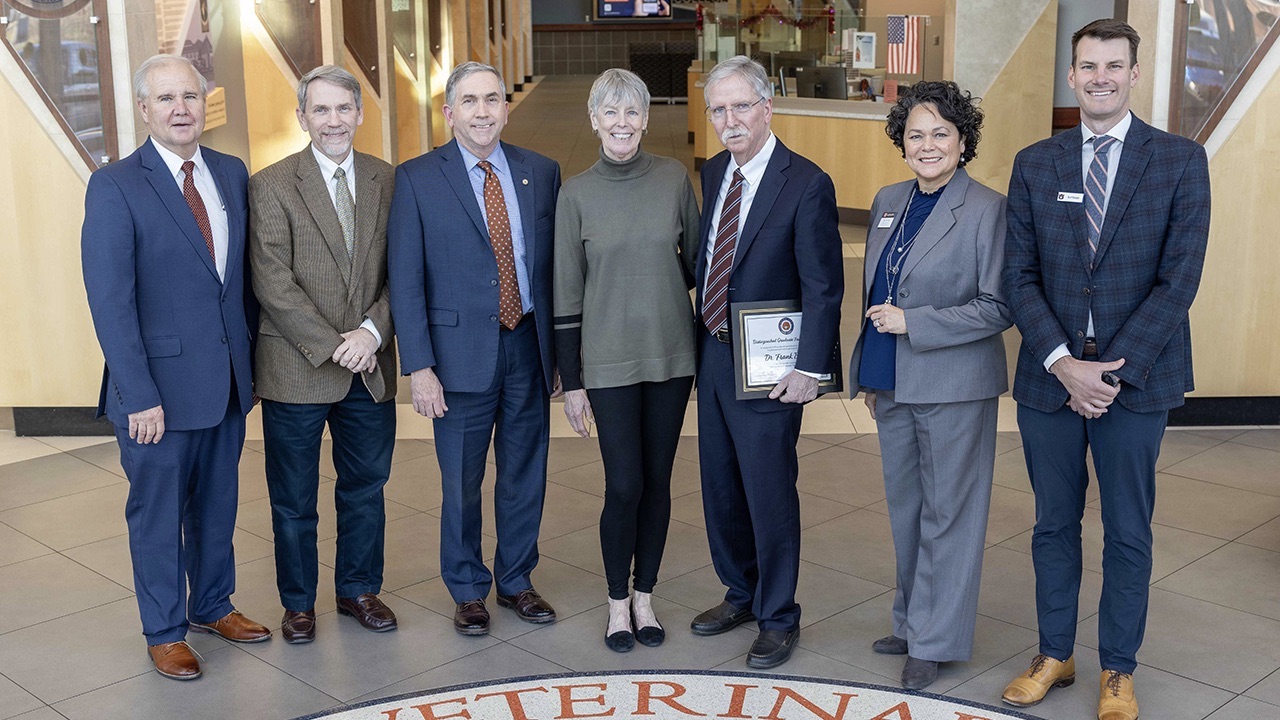
Frank Bartol (third from the right) after delivering the 2024 Distinguished Graduate Faculty Lecture with, from left to right, George Flowers, Robert Judd, Dean Calvin Johnson, Anne Wiley, Maria Witte and Kurt Sasser.
A leader of many
Once Bartol became associate dean of research and graduate studies in 2009, his leadership responsibilities broadened, and he was able to facilitate the actions of large groups of gifted scientists.
Bartol serves as administrative principal investigator for Auburn’s Detection Canine Science Innovation, Technology and Education program, better known as DCSITE, and he is “so proud of how the program has evolved.”
Bartol’s achievements also include:
- Founding director of the AU Cellular and Molecular Biosciences (CMB) program;
- Founding AU Campus Coordinator of the Alabama EPSCoR Graduate Research Scholars program;
- Interim director of the AUCVM Scott-Ritchey Research Center;
- Establishment of the Animal Health and Agro-/Bio-Defense Program (AHAD) as a component of USDA-ARS National Program 103;
- Advancement of the Auburn University Equine Plasma Project;
- Administrative lead on establishment of undergraduate Public Health minor and the BS in Public and One Health (PAOH) program;
- Development of global Online Reproductive Science & Health Course; and
- Establishment of first AUCVM mentored undergraduate research course options
Auburn offers perfect environment
Bartol credits Auburn with providing him with an environment in which he could achieve many things.
“I appreciate Auburn for its environment, the collegiality and, of course, the students,” Bartol said. “That’s the main reason people in academia stay. Auburn has bright students and attracts bright students.”
Pursue Excellence at Auburn.
Discover CVMPast Auburn SEC Faculty Achievement Award winners
2023, Shiwen Mao, Samuel Ginn College of Engineering
2022, Karen McNeal, College of Sciences and Mathematics
2021, Mona El-Sheikh, College of Human Sciences
2020, Doug Martin, College of Veterinary Medicine
2019, Rex Dunham, College of Agriculture
2018, David Ketchen, Raymond J. Harbert College of Business
2017, James Barth, Raymond J. Harbert College of Business
2016, Hanqin Tian, College of Forestry, Wildlife and Environment
2015, Bruce Tatarchuk, Samuel Ginn College of Engineering
2014, Geoffrey Hill, College of Sciences and Mathematics
2013, Pradeep Lall, Samuel Ginn College of Engineering
2012, Christopher B. Roberts, Samuel Ginn College of Engineering



